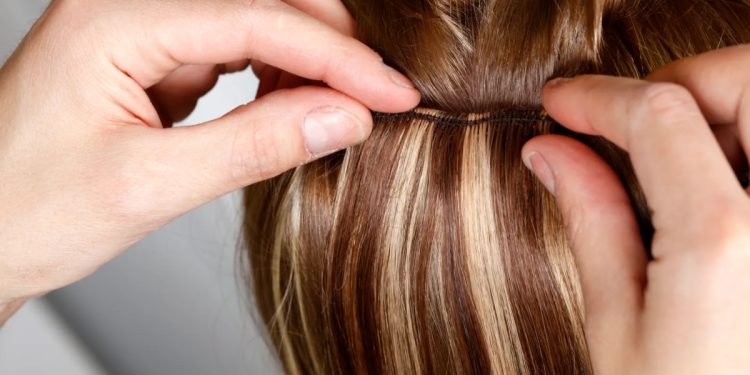When it comes to styling with hair extensions, maintaining a healthy scalp can be challenging, especially if moisture isn’t prioritized. Hair extensions offer an incredible way to switch up your look, add volume, and experiment with length, but without proper hydration, you might notice dryness on your scalp and natural hair. This dryness can lead to irritation, itching, and even breakage, making it crucial to adopt a routine that keeps your scalp and hair nourished. Here, we’ll walk through some effective strategies for keeping your scalp healthy and hydrated, allowing you to fully enjoy the versatility of hair extensions without compromising on hair health.
1. Choose Quality Extensions for Scalp Comfort
Not all extensions are created equally, and your choice of hair extensions can impact the health of your scalp and natural hair. Relaxed Straight Hair Extensions, for example, are a fantastic option for those looking to maintain a sleek and manageable look while prioritizing scalp comfort. These types of extensions, when made from high-quality materials, are often gentler on the scalp and natural hair compared to synthetic alternatives that may cause friction and dryness.
Selecting extensions made from real human hair or high-quality synthetic options can make a noticeable difference in moisture retention. These types are less likely to pull on your natural hair and often blend better, reducing the risk of dryness due to tugging and strain. Additionally, consider lighter-weight extensions if you have a sensitive scalp, as they can decrease tension, allowing your scalp to breathe and helping to maintain its natural moisture balance. Keeping your scalp comfortable through high-quality choices is a foundational step toward maintaining healthy, hydrated hair.
2. Use a Hydrating Scalp Treatment
If you’re a fan of Deep Curly Hair extensions, you may notice that curly styles require extra care to prevent dryness. Curly textures tend to absorb more moisture, and your scalp may become dry over time if it isn’t receiving additional hydration. To counter this, incorporating a hydrating scalp treatment into your routine is essential. A quality scalp serum or oil can lock in moisture and keep your scalp nourished. Look for products with ingredients like aloe vera, jojoba oil, or coconut oil, as they have natural moisturizing properties without causing build-up.
Massage the treatment into your scalp at least twice a week, focusing on areas where the extensions attach to your natural hair. This practice not only promotes hydration but also improves blood circulation, supporting a healthy scalp environment. If you wear extensions frequently, opt for lightweight, non-comedogenic oils that can provide hydration without clogging your scalp pores. These treatments work wonders in keeping the scalp balanced and preventing the dryness that sometimes accompanies hair extensions.
3. Adopt a Moisture-Friendly Washing Routine
Washing your hair and scalp properly is crucial when wearing extensions, yet over-washing can strip your scalp of its natural oils, leading to dryness. Striking a balance with a moisture-friendly washing routine is key. When shampooing, use sulfate-free and hydrating shampoos designed to retain moisture. Sulfate-free formulas are gentler and will prevent the over-drying of both your natural hair and scalp. Focus on cleansing the scalp, and gently rinse through the lengths to avoid disturbing the extensions.
After washing, follow up with a leave-in conditioner or a moisturizing spray, especially on extensions and the ends of your natural hair. This step adds an extra layer of hydration and protection against dryness. Additionally, avoid extremely hot water, which can strip natural oils, opting for lukewarm water instead. Following this routine will keep your scalp refreshed and hydrated while extending the life and vibrancy of your extensions.
4. Protect Your Hair and Scalp Overnight
Sleep can be an unexpected culprit of dryness for both your scalp and extensions. By adopting some simple bedtime habits, you can lock in moisture and keep your hair looking its best. Wrapping your hair in a silk or satin scarf or using a satin pillowcase can reduce friction and prevent moisture loss, as these materials don’t absorb oils like cotton does. This is especially beneficial if you have textured extensions, like curly or kinky hair, which are more prone to dryness.
In addition to using a scarf or pillowcase, consider applying a light hydrating mist before bed to keep your scalp moisturized overnight. Some people find that using a humidifier in the bedroom can also help maintain moisture in the air, which benefits both skin and hair. These small but effective changes in your nightly routine can play a big role in preserving scalp hydration, making a noticeable difference over time.
5. Avoid Excessive Heat Styling and Use Protective Products
Using heat styling tools on extensions can cause your scalp to dry out over time, especially when tools are used frequently. Excessive heat can rob the hair and scalp of essential moisture, so it’s important to limit the use of hairdryers, flat irons, and curling wands. When you do opt for heat styling, always apply a heat protectant spray to shield both your natural hair and extensions from damage.
Heat protectant sprays create a barrier that locks in moisture and prevents your hair from becoming brittle and dry. Additionally, whenever possible, embrace low-heat or heatless styling techniques. For example, braid or twist your Deep Curly Hair extensions to achieve natural waves without exposing your hair to heat. These small adjustments can help you enjoy various styles without compromising the moisture levels in your scalp and extensions.
With these tips, you can maintain a healthy scalp and hydrated hair while enjoying the flexibility that hair extensions offer. By choosing high-quality products, practicing proper hydration techniques, and being mindful of your routine, you’ll keep your scalp balanced, nourished, and ready to support beautiful hair, day in and day out.








